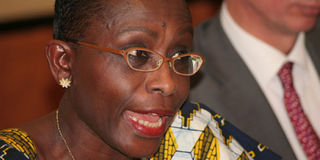IMF Africa boss to launch economic outlook

The Director of the International Monetary Fund's African Department, Antoinette Sayeh, will launch the African economic outlook at the Hotel Intercontinental October 19, 2011.
The head of the International Monetary Fund (IMF) for Africa is expected in the country on Wednesday as the government seeks to borrow additional dollars to shore up the depreciating shilling.
Finance minister Uhuru Kenyatta made the disclosure on Antoinette Sayeh visit in Parliament on Tuesday evening after he presented a statement on the state of the shilling.
Ms Sayeh, Director of the IMF's African Department, will launch the African economic outlook at the Hotel Intercontinental, Nairobi Wednesday. Separately, an IMF staff mission is in Nairobi for the second review of Kenya's Extended Credit Facility (ECF) supported program.
Last week, Finance permanent secretary Joseph Kinyua said the government would be asking between Sh25 billion ($250 million) and Sh35 billion ($350 million) from the IMF.
This will be over the Sh50 billion ($500 million) extended credit facility agreed on with the international organisation in February. The Treasury feels the funds will help boost the shilling’s value against the dollar.
On Tuesday, Mr Kenyatta said he was unaware that five banks were hoarding stocks of the dollar, causing the depreciation of the shilling against the US currency over the past six months.
Mr Kenyatta told MPs there had never been discussions of any five banks alleged to be behind the drop in the value of the shilling.
“There have been too many statements made and reported differently and I am not aware of the said five banks as there has been no such information from the Central Bank governor,” said Mr Kenyatta.
“I was not here and I repeat I was not aware and that (about the banks) has not been said in the many meetings we have had,” he added under pressure from the backbenchers.
This directly contradicts a disclosure by CBK governor Njuguna Ndung’u who said on June 23 that an audit by the regulator had showed the five banks exported $260 million (Sh26 billion) over one week.
He did not name the banks in the public, but he is believed to have repeated the same information when he met the Finance, Trade and Planning Committee two weeks ago.
Prof Ndung’u promised in June that punitive action would be taken on the financial institutions, which are regulated by CBK as outlined in the Banking Act.
The shilling has firmed up since the CBK increased the base lending rate to 11 per cent and halved the amount banks are mandated to hold in foreign exchange to 10 per cent. (READ: Stabilising the shilling in word and deed)
On Tuesday, MPs were critical of the recent action to get the shilling back on its feet, which they lamented had been implemented too late.
Mr Benjamin Lang’at (Ainamoi, ODM) said the policy changes were cosmetic as Mr John Mbadi (Gwassi, ODM) said the conflicting statements by the governor had caused panic.
“First you say you’ll not intervene and then a few days later you say there are five banks holding money, and you’ll take action on them. That’s conflicting,” said Mr Mbadi.
Mr Kenyatta was presenting a statement after the lifting of his ban in Parliament due to the failure to present statements on the shilling requested on June 16 and July 21.
Dr Boni Khalwale (Ikolomani, New Ford Kenya) alleged that Equity Bank had received favourable treatment from the Treasury, allowing it to buy so many dollars sparking a scramble by the rest of the banks and leading to the subsequent depreciation of the shilling.
This was denied by Mr Kenyatta, who said he was not aware of the said preferential treatment.
Poor relationship
Dr Khalwale also alleged there was a poor relationship between the CBK governor and players in the banking sector.
He said Prof Ndung’u should be fired from the job on the basis of the recommendations of the Cockar Commission on the sale of the former Grand Regency Hotel.
But Mr Kenyatta said the appointing authority is the President and the governor has security of tenure, meaning his removal from that office would be a tedious and lengthy process.
However, the Finance minister conceded that the relationship between the Treasury and the banking sector was not as it should be and that there would be efforts to make it better.
He said the government would speed up Bills to allow for the exportation of minerals in the country, whose exportation would earn foreign exchange and reduce the demand that leads to depreciation of the shilling.
EDITOR'S NOTE: In our earlier version, we had indicated that Christine Lagarde, Managing Director of the IMF, was expected in the country on Wednesday. We have since established that this is not the case and that Antoinette Sayeh, Director of the IMF's African Department, would instead be making the visit. The error is regretted.




